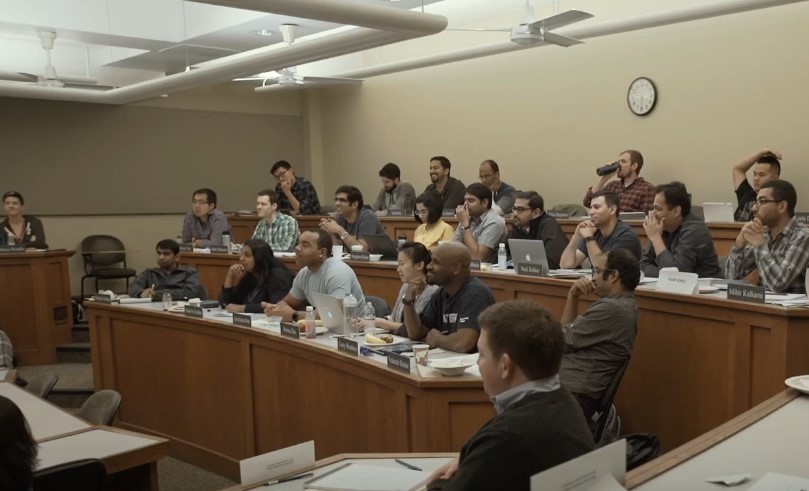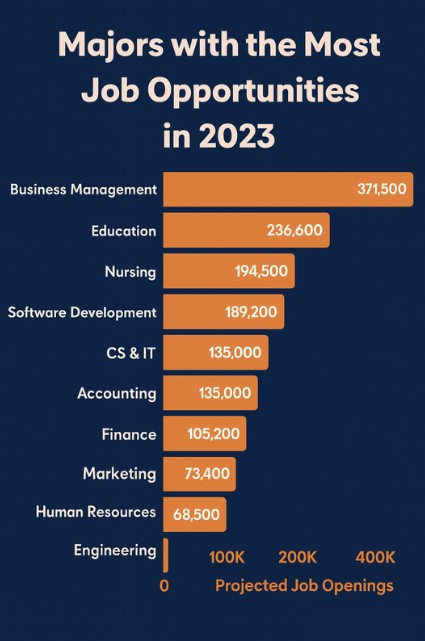
Share Post:
Choosing a major is a big deal. It shapes your early career, influences your skillset, and, in many ways, sets the tone for how adaptable you’ll be in the workforce.
With today’s job market shifting faster than ever, thanks to tech, remote work, automation, and changing industries, career flexibility isn’t just a bonus. It’s essential.
So, what exactly gives a major that kind of staying power? It comes down to transferable skills. Things like communication, data literacy, problem-solving, and adaptability travel well across roles and sectors. The more of those a degree gives you, the more options you have down the line.
Let’s look at the majors that consistently deliver that kind of flexibility, backed by real job growth data, salary projections, and examples of how people use them in the real world.
What Makes a Major “Flexible”?
Career flexibility isn’t about being vague. It’s about being versatile.
A flexible major gives you skills you can apply across industries, roles, and even economic shifts. You can move laterally (say, from healthcare to tech) or upward into leadership, without starting over from scratch.
Think of it as having a toolkit that fits into many jobs – not just one.
Some majors are tightly tied to specific professions (like dentistry or aviation), while others open doors in multiple directions. If you’re looking for options that won’t box you in, the following degrees are some of the strongest bets.
Business Administration and Management

Why it’s flexible: Business runs the world. And this degree touches nearly every part of it – from operations and finance to marketing and leadership.
Core Skills You Walk Away With
- Strategic planning
- Leadership and organizational management
- Financial literacy
- Communication and negotiation
Common Roles
- Operations manager
- Business analyst
- Project coordinator
- Entrepreneur
- Marketing lead
Real-world example: Someone might start out as a product assistant at a fashion label and end up managing logistics for a healthcare startup. The skills carry over.
Salary + Growth Data
- Median salary (management analyst): $93,000
- Projected job growth (2021–2031): 7%
Health Sciences (Nursing, Healthcare Admin)
Why it’s flexible: With healthcare demand rising, degrees in health-related fields offer long-term career options across clinical, administrative, and public health roles.
What you Learn
- Clinical procedures
- Healthcare policy
- Health information systems
- Patient care coordination
Career Options
- Registered nurse
- Healthcare administrator
- Public health advocate
- Case manager
- Medical researcher
Tip: Consider also pursuing an online RN to BSN degree to enhance your credentials and access roles beyond entry‑level nursing positions.
Salary + Growth Data
- Median salary (RNs): $81,220
- Projected job growth (2021–2031): 6–28% depending on role
Computer Science and Information Technology

Why it’s flexible: Tech touches every industry now – from agriculture to entertainment. That gives CS grads a serious edge.
Key Strengths
- Software development
- Problem-solving
- Data structures and system design
- Cybersecurity and IT management
Career Options
- Software engineer
- Systems analyst
- Data scientist
- IT consultant
- UX developer
Real-world example: A developer starts out writing code for a retail site and ends up as a data analyst for a hedge fund. Same core skills, different applications.
Salary + Growth Data
- Median salary (software developers): $120,730
- Projected job growth (2021–2031): 15%, with developers at 27%
Engineering (Various Fields)
Why it’s flexible: Engineering teaches you how to think through problems in a structured, analytical way. That mindset fits just as well in R&D labs as in management roles.
What You Learn
- Systems thinking
- Technical design
- Math-heavy problem-solving
- Project management
Possible Careers
- Civil engineer
- Mechanical designer
- Operations manager
- Energy consultant
- Product engineer
Real-world example: A mechanical engineer working on car engines transitions into designing solar power components. The underlying logic and design thinking stay the same.
Salary + Growth Data
- Median salary (chemical engineers): $133,000
- Projected job growth (2021–2031): 6%, with biomedical engineering at 10%
Mathematics and Statistics

Why it’s flexible: Numbers are everywhere. From marketing to meteorology, analytical thinking and statistical modeling are hot commodities.
Skills That Stick
- Data analysis
- Statistical modeling
- Quantitative reasoning
- Risk assessment
Roles to Consider
- Data scientist
- Market research analyst
- Actuary
- Financial modeler
- Operations researcher
Real-world example: A math grad might analyze data for pharmaceutical trials, then shift into pricing strategy at an e-commerce firm.
Salary + Growth Data
- Median salary (data scientists): $100,910
- Projected job growth (2021–2031): 30%
Communications and English
Why it’s flexible: Every industry needs people who can write clearly, speak persuasively, and make ideas resonate. That’s the superpower of a solid liberal arts background.
Core Skills
- Writing and editing
- Public speaking
- Research and storytelling
- Media and content strategy
Popular Paths
- Content strategist
- Public relations manager
- Copywriter
- Technical writer
- Internal communications specialist
Real-world example: Someone might begin as a journalist and later move into branding at a consumer tech company. It’s all about message clarity and audience understanding.
Salary + Growth Data
- Median salary (PR specialists): $66,750
- Projected job growth (2021–2031): 4–10%
Psychology
Why it’s flexible: Psychology helps you make sense of human behavior. That insight is valuable in business, education, healthcare, design – you name it.
Transferable Strengths
- Behavioral research
- Interpersonal communication
- Empathy and active listening
- Conflict resolution
Career Options
- HR specialist
- Market research analyst
- Social services coordinator
- UX researcher
- Counselor (with further study)
Salary + Growth Data
- Median salary (market research analysts): $63,920
- Projected job growth (2021–2031): 6%
Social Sciences (Economics, Sociology, Political Science)
Why it’s flexible: These majors help you spot patterns in society, economy, and policy. That kind of thinking fits roles in research, policy-making, consulting, and analytics.
What You Gain
- Data interpretation
- Public policy analysis
- Economic modeling
- Research design
Career Directions
- Policy analyst
- Economist
- Research associate
- Non-profit strategist
- Business consultant
Real-world example: An economics grad might work as a financial analyst, then move into government policy advising. It’s still about analyzing outcomes and making recommendations.
Salary + Growth Data
- Median salary (economists): $105,630
- Projected job growth (2021–2031): 5–7%
Education

Why it’s flexible: Teaching builds leadership, organization, and communication skills. Those aren’t just for the classroom – they’re useful in corporate training, edtech, HR, and more.
Key Capabilities
- Instructional design
- Communication
- Time and behavior management
- Curriculum development
Career Options
- Teacher
- Instructional designer
- Corporate trainer
- Curriculum specialist
- Education policy analyst
Salary + Growth Data
- Median salary (high school teachers): $61,820
- Projected job growth (2021–2031): 4–8%
Finance and Accounting
Why it’s flexible: Numbers run the business world, and fluency in finance opens doors across sectors – from startups to the public sector.
Core Skill Set
- Budgeting
- Financial reporting
- Tax planning
- Investment analysis
Job Types
- Accountant
- Budget analyst
- Financial planner
- Auditor
- Risk consultant
Real-world example: A financial analyst at a bank might later transition into budget planning for a city government or nonprofit.
Salary + Growth Data
- Median salary (financial analysts): $95,570
- Projected job growth (2021–2031): 6–7%
Quick Comparison Table
| Major | Median Salary | Job Growth (2021–2031) | Sample Career Paths |
|---|---|---|---|
| Business Admin | $93,000 | 7% | Project manager, consultant, entrepreneur |
| Computer Science/IT | $120,730 | 15% | Developer, data analyst, cybersecurity expert |
| Engineering | $133,000 (Chemical Eng.) | 6% | Engineer, R&D manager, sustainability consultant |
| Math/Statistics | $100,910 | 30% | Data scientist, actuary, analyst |
| Communications/English | $66,750 | 4–10% | PR manager, content creator, tech writer |
| Psychology | $63,920 | 6% | HR specialist, behavior analyst, market researcher |
| Social Sciences | $105,630 (Economics) | 5–7% | Policy advisor, researcher, consultant |
| Education | $61,820 | 4–8% | Teacher, trainer, curriculum designer |
| Finance/Accounting | $95,570 | 6–7% | Financial analyst, accountant, risk advisor |
| Health Sciences | $81,220 (RNs) | 6–28% | Nurse, admin leader, public health specialist |
Things to Think About When Choosing a Flexible Major
A flexible major is a solid base, but you still want to align it with what genuinely interests you. A degree alone won’t carry you – what you do with it matters.
Questions to Ask Yourself:
- Do I enjoy the core skills this major teaches?
- What industries interest me long-term?
- Am I willing to pursue additional certifications if needed?
- Does this field offer stability and room to grow?
For some majors (like nursing or accounting), professional licensing might be required. For others (like communications or math), it’s more about building a portfolio or gaining project experience.
Final Thoughts
If you want a career that bends instead of breaks under change, the right major helps. Business, tech, engineering, math, and even the humanities all have their place – as long as they offer skills that transfer well and scale over time.
Career flexibility doesn’t mean being vague or aimless. It means being ready for anything. Pick a path that gives you options, and you’ll have room to grow, adapt, and move toward whatever comes next.
Related Posts:
- Why More Students Should Embrace Asynchronous…
- Changing Careers After 40 - Why Education Matters…
- 10 Best After-School Extracurricular Activities for…
- How Do Career Changers Benefit From Accelerated…
- 10 Best Postgraduate Degrees For A Business Career In 2026
- Marketing Major Versus Business Major - Differences…










